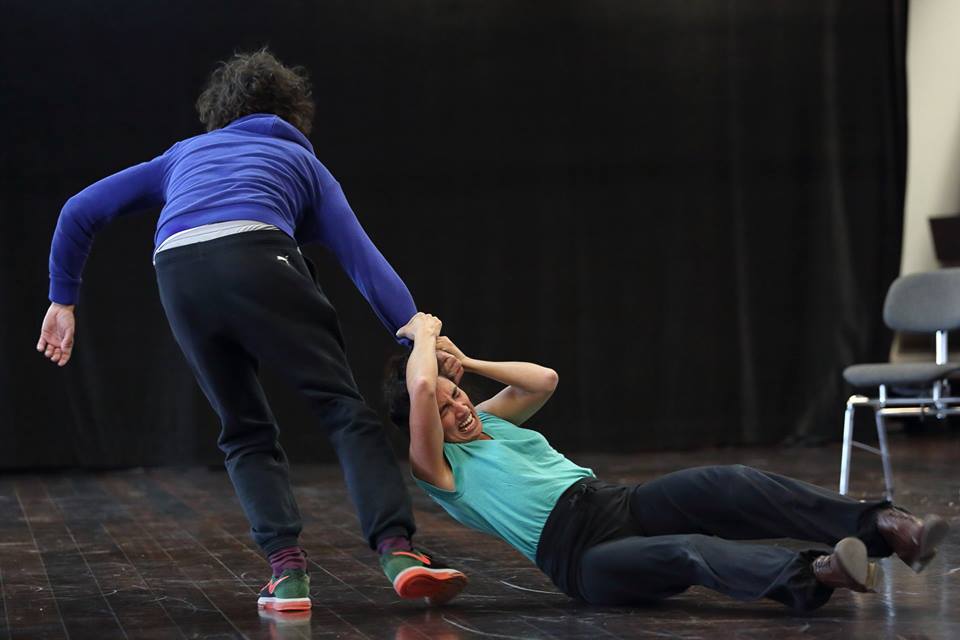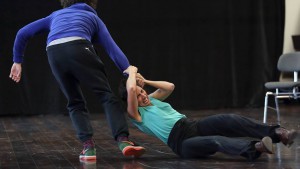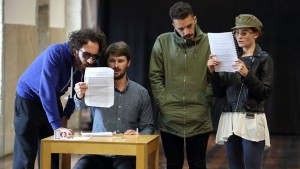The objects in the mirror are closer than they appear
a comment on the ISO residency in Porto

Up and down, up and down, up and down. That’s how the streets of Porto take you around, from a small café full of students lost in their books to the sound of crackling vinyls, to the stream of tourists going down to the riverside. Strong wind, some rays of sun, a lot of rain. This is the weather that welcomes a one-week ISO residency at the National Theatre São João, a time warp dedicated to creation and brainstorming.
The International Super Objective Theatre (ISO) is a project developed in the context of the 2012 UTE Decentralized Academy. Initiated in the course of a masterclass directed by Russian stage director Lev Dodin in Saint Petersburg, the ISO is a collective of young theatre artists from all over Europe and beyond, with the aim to explore what being European means today through theatre practices.
The kind of work that Nuno Carinhas and Nuno M. Cardoso conducted with the group of actors resembled the one made in a science lab, playing with elements and doses, provoking reactions between the performers and the spectators. The choice to use the original text of Karl Kraus’s The Last Days of Mankind and mix it with its English, French and Bulgarian translations revealed so many contradictions. The contradictions of a continent that would like to act and reason with a collective mind and realizes that it sometimes is not even able to understand its own words.
In one scene, an officer dictates a letter to a secretary, who—not speaking the language—finds no other way to execute the task than to perform a frenzied pantomime that mimics voice tones and their supposed meaning.
The result is an ironically distorted mirror of what is happening nowadays not just with respect to Europe, but whenever we consider the nature of our current modes of communication, overwhelmed by a Babel of contradictory signs and tools that give the illusion of a closer distance.
We might join this group of people for a simple stroll through the park or for a cup of chà in a secret and fancy-furnished tearoom in Porto, and a passionate conversation on religion and faith would seamlessly intertwine with comments on the structures of national theatres, with no need for excuses. There is always something refreshing in getting deeper into an artist’s mind, where every single detail of perception transforms into one element of an organic process.
For the journalists invited to cover the story the open rehearsal—held in front of a small but very attentive audience in the rehearsal room of the Mosteiro São Bento da Vitória—was just the starting point, to dig a way down to an even more complex process.
The group first gathered four years ago; the workforce has been changing, including new nationalities that have joined and introduced new perspectives, pursuing a sort of balance which doesn’t accept to be frozen by any hierarchal system. Angelique, Balázs, Bilyana, Boris, Khwala, Kim, Luís, Petya and Vincent (part of a larger group) got to know each other better and better, and are now aware of their common past and in search of a common future.
Sitting at their table for seven meals, having a drink together, playing childish games in the park a few hours before leaving Porto was such a great learning experience. But what was even more compelling for a journalist was the need to learn a different state of beholding, to find a way to be present without interfering. Being there while the group was spreading and discussing and changing ideas clacking on the notebooks and scribbling on the notepads meant to testify how the creative process is something, again, contradictory by nature: it demands of you to be in control and, at the same time, to be willing to be obstructed and put in crisis. As Italo Calvino stated, “The perfect idea is the one that is open to be discarded to make room for a better one.”
Between doubts about which should be the textual base for a further research and very different views on aesthetics and poetics of the performing arts, the core of the attention was in fact a meeting point: an actor and an actress on stage can (and must) be the keynote speakers for a tough but necessary discourse on contemporary society; because every shared action is a political one. And political acts are at the heart of a collectivity and the key to its consciousness made alive. Here’s the ultimate, fruitful contradiction: the members of a collective win back an individual prominence. And that’s why the International Super Objective Theatre should not forget to stay subjective.
Published on 27 June 2016 (Article originally written in Italian)

